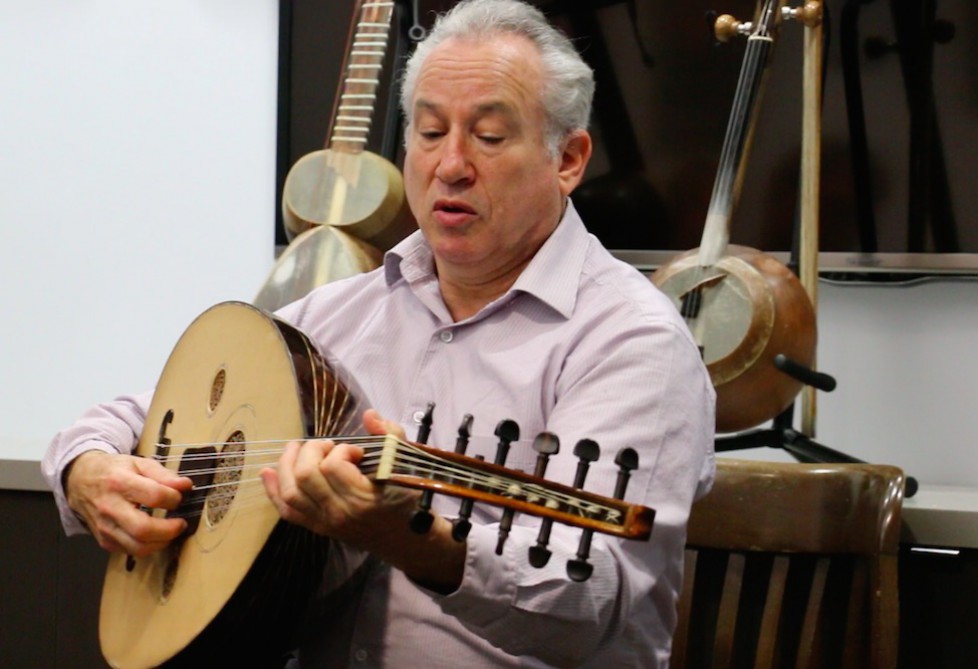Delightful Azerbaijani mugham mesmerizes American students

By Amina Nazarli
One of the best known Americans in Azerbaijan, Jeffrey Werbock, who is also acclaimed U.S. mugham specialist held a presentation on Azerbaijan`s mugham at the George Washington University.
Held as part of the 16th annual meeting of the Central Eurasian Studies Society of the Elliott School of International Affairs on October 15-18, the event hosted 60 panels, from political science, sociology and anthropology, to history and literature, covering the five post-Soviet Central Asian states, the Caucasus, Xinjiang, Afghanistan, and Russian Muslim regions.
The presentation included an instrumental solo improvisations based on traditional mugham and played on the national instruments - oud, kamancha and tar-, as well as a lecture on the theory and history of Azerbaijani mugham.
The musician spoke about his 40 years of experience in the research and performance of mugham.
Werbock is one of the most unique musicians of the USA, who fell
in love with Azerbaijani music in 1971 and devoted his life to the
promotion of Azerbaijani mugham.
Recalling the first years of his acquaintance with this seductive
music, Werbock said he taught himself to play Tar to form a
traditional trio ensemble with the assistance of a gaval
player.
"Then, someone gave me an oud to keep for a while so I began to teach myself how to play Mugham on oud, translating both from Tar and from Kamancha. What happened then was very interesting to me. The classical "canonical" version of Mugham began to break down and reassemble around a highly improvisatory way of playing Mugham.
Werbock still enjoy classic mugham as it is played by professional Azerbaijani instrumentalists, but he found a greater interest in playing a looser, more free form mugham such as might be heard at weddings and other non-concert settings. Teaching himself to play on Oud offered the musician the opportunity to explore different ways of expressing the melodic lines of Mugham, which then influenced how Werbock approaches Mugham on Tar and Kamancha, now very improvisatory.
He gave hundreds of concerts and lectures in museums, colleges, universities and community centers in the U.S., Israel and other countries.
Inspired by irresistible power of Azerbaijan's folk music,
Werbock, created a documentary film that has been presented in many
major short film festivals.
Earlier, he told Azernews about the history of its creation. He
said his team worked on this ethnographic documentary film project
about the miraculous phenomenon of the Azerbaijani children who are
capable of singing one of the most complex forms of music in the
world known as Mugham.
"When I first heard about Mugham, the first time I listened to it,
I recognized its sophistication and appreciated the depth of
feeling and the intensity of experience. So, when I was first told
that children can sing Mugham, I thought they were joking. I
thought maybe they can sing a very simplified version of it,"
Werbock said.
Thinking about the power of Mugham that can make children be able
to sing it, Werbock highlights the overwhelming energy of this
music that came across an ocean and a continent and grabbed him, an
American with no ties to Azerbaijan, and completely turned his life
upside down and inside out, and made him devote his life totally to
the promotion of Mugham in the western world.
--
Amina Nazarli is AzerNews’ staff journalist, follow her on
Twitter: @amina_nazarli
Follow us on Twitter @AzerNewsAz
Here we are to serve you with news right now. It does not cost much, but worth your attention.
Choose to support open, independent, quality journalism and subscribe on a monthly basis.
By subscribing to our online newspaper, you can have full digital access to all news, analysis, and much more.
You can also follow AzerNEWS on Twitter @AzerNewsAz or Facebook @AzerNewsNewspaper
Thank you!
